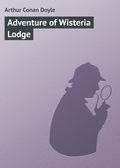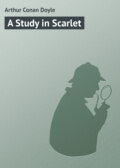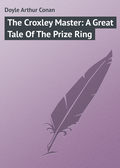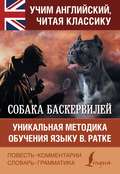
Артур Конан Дойл
Rodney Stone
"I know you for what you are, Sir Charles, and that is a noble, slap-up Corinthian. But if I was to use this against you, d'ye see, it would be worth 'undreds in my pocket. But my 'eart won't let me do it, for Bill Warr's always been on the side o' good sport and fair play. If I use it for you, then I expect that you won't see me the loser."
"You can do what you like," said my uncle. "If your news is of service to me, I shall know how to treat you."
"You can't say fairer than that. We'll let it stand there, gov'nor, and you'll do the 'andsome thing, as you 'ave always 'ad the name for doin'. Well, then, your man, Jim 'Arisen, fights Crab Wilson, of Gloucester, at Crawley Down to-morrow mornin' for a stake."
"What of that?"
"Did you 'appen to know what the bettin' was yesterday?"
"It was three to two on Wilson."
"Right you are, gov'nor. Three to two was offered in my own bar– parlour. D'you know what the bettin' is to-day?"
"I have not been out yet."
"Then I'll tell you. It's seven to one against your man."
"What?"
"Seven to one, gov'nor, no less."
"You're talking nonsense, Warr! How could the betting change from three to two to seven to one?"
"Ive been to Tom Owen's, and I've been to the 'Ole in the Wall, and I've been to the Waggon and 'Orses, and you can get seven to one in any of them. There's tons of money being laid against your man. It's a 'orse to a 'en in every sportin' 'ouse and boozin' ken from 'ere to Stepney."
For a moment the expression upon my uncle's face made me realize that this match was really a serious matter to him. Then he shrugged his shoulders with an incredulous smile.
"All the worse for the fools who give the odds," said he. "My man is all right. You saw him yesterday, nephew?"
"He was all right yesterday, sir."
"If anything had gone wrong I should have heard."
"But perhaps," said Warr, "it 'as not gone wrong with 'im YET."
"What d'you mean?"
"I'll tell you what I mean, sir. You remember Berks? You know that 'e ain't to be overmuch depended on at any time, and that 'e 'ad a grudge against your man 'cause 'e laid 'im out in the coach-'ouse. Well, last night about ten o'clock in 'e comes into my bar, and the three bloodiest rogues in London at 'is 'eels. There was Red Ike, 'im that was warned off the ring 'cause 'e fought a cross with Bittoon; and there was Fightin' Yussef, who would sell 'is mother for a seven-shillin'-bit; the third was Chris McCarthy, who is a fogle-snatcher by trade, with a pitch outside the 'Aymarket Theatre. You don't often see four such beauties together, and all with as much as they could carry, save only Chris, who is too leary a cove to drink when there's somethin' goin' forward. For my part, I showed 'em into the parlour, not 'cos they was worthy of it, but 'cos I knew right well they would start bashin' some of my customers, and maybe get my license into trouble if I left 'em in the bar. I served 'em with drink, and stayed with 'em just to see that they didn't lay their 'ands on the stuffed parroquet and the pictures.
"Well, gov'nor, to cut it short, they began to talk about the fight, and they all laughed at the idea that young Jim 'Arrison could win it – all except Chris, and e' kept a-nudging and a-twitchin' at the others until Joe Berks nearly gave him a wipe across the face for 'is trouble. I saw somethin' was in the wind, and it wasn't very 'ard to guess what it was – especially when Red Ike was ready to put up a fiver that Jim 'Arrison would never fight at all. So I up to get another bottle of liptrap, and I slipped round to the shutter that we pass the liquor through from the private bar into the parlour. I drew it an inch open, and I might 'ave been at the table with them, I could 'ear every word that clearly.
"There was Chris McCarthy growlin' at them for not keepin' their tongues still, and there was Joe Berks swearin' that 'e would knock 'is face in if 'e dared give 'im any of 'is lip. So Chris 'e sort of argued with them, for 'e was frightened of Berks, and 'e put it to them whether they would be fit for the job in the mornin', and whether the gov'nor would pay the money if 'e found they 'ad been drinkin' and were not to be trusted. This struck them sober, all three, an' Fighting Yussef asked what time they were to start. Chris said that as long as they were at Crawley before the George shut up they could work it. 'It's poor pay for a chance of a rope,' said Red Ike. 'Rope be damned!' cried Chris, takin' a little loaded stick out of his side pocket. 'If three of you 'old him down and I break his arm-bone with this, we've earned our money, and we don't risk more'n six months' jug.' ''E'll fight,' said Berks. 'Well, it's the only fight 'e'll get,' answered Chris, and that was all I 'eard of it. This mornin' out I went, and I found as I told you afore that the money is goin' on to Wilson by the ton, and that no odds are too long for the layers. So it stands, gov'nor, and you know what the meanin' of it may be better than Bill Warr can tell you."
"Very good, Warr," said my uncle, rising. "I am very much obliged to you for telling me this, and I will see that you are not a loser by it. I put it down as the gossip of drunken ruffians, but none the less you have served me vastly by calling my attention to it. I suppose I shall see you at the Downs to-morrow?"
"Mr. Jackson 'as asked me to be one o' the beaters-out, sir."
"Very good. I hope that we shall have a fair and good fight. Good day to you, and thank you."
My uncle had preserved his jaunty demeanour as long as Warr was in the room, but the door had hardly closed upon him before he turned to me with a face which was more agitated than I had ever seen it.
"We must be off for Crawley at once, nephew," said he, ringing the bell. "There's not a moment to be lost. Lorimer, order the bays to be harnessed in the curricle. Put the toilet things in, and tell William to have it round at the door as soon as possible."
"I'll see to it, sir," said I, and away I ran to the mews in Little Ryder Street, where my uncle stabled his horses. The groom was away, and I had to send a lad in search of him, while with the help of the livery-man I dragged the curricle from the coach-house and brought the two mares out of their stalls. It was half an hour, or possibly three-quarters, before everything had been found, and Lorimer was already waiting in Jermyn Street with the inevitable baskets, whilst my uncle stood in the open door of his house, clad in his long fawn-coloured driving-coat, with no sign upon his calm pale face of the tumult of impatience which must, I was sure, be raging within.
"We shall leave you, Lorimer," said he. "We might find it hard to get a bed for you. Keep at her head, William! Jump in, nephew. Halloa, Warr, what is the matter now?"
The prizefighter was hastening towards us as fast as his bulk would allow.
"Just one word before you go, Sir Charles," he panted. "I've just 'eard in my taproom that the four men I spoke of left for Crawley at one o'clock."
"Very good, Warr," said my uncle, with his foot upon the step.
"And the odds 'ave risen to ten to one."
"Let go her head, William!"
"Just one more word, gov'nor. You'll excuse the liberty, but if I was you I'd take my pistols with me."
"Thank you; I have them."
The long thong cracked between the ears of the leader, the groom sprang for the pavement, and Jermyn Street had changed for St. James's, and that again for Whitehall with a swiftness which showed that the gallant mares were as impatient as their master. It was half-past four by the Parliament clock as we flew on to Westminster Bridge. There was the flash of water beneath us, and then we were between those two long dun-coloured lines of houses which had been the avenue which had led us to London. My uncle sat with tightened lips and a brooding brow. We had reached Streatham before he broke the silence.
"I have a good deal at stake, nephew," said he.
"So have I, sir," I answered.
"You!" he cried, in surprise.
"My friend, sir."
"Ah, yes, I had forgot. You have some eccentricities, after all, nephew. You are a faithful friend, which is a rare enough thing in our circles. I never had but one friend of my own position, and he– but you've heard me tell the story. I fear it will be dark before we reach Crawley."
"I fear that it will."
"In that case we may be too late."
"Pray God not, sir!"
"We sit behind the best cattle in England, but I fear lest we find the roads blocked before we get to Crawley. Did you observe, nephew, that these four villains spoke in Warr's hearing of the master who was behind them, and who was paying them for their infamy? Did you not understand that they were hired to cripple my man? Who, then, could have hired them? Who had an interest unless it was – I know Sir Lothian Hume to be a desperate man. I know that he has had heavy card losses at Watier's and White's. I know also that he has much at stake upon this event, and that he has plunged upon it with a rashness which made his friends think that he had some private reason for being satisfied as to the result. By Heaven, it all hangs together! If it should be so —!" He relapsed into silence, but I saw the same look of cold fierceness settle upon his features which I had marked there when he and Sir John Lade had raced wheel to wheel down the Godstone road.
The sun sank slowly towards the low Surrey hills, and the shadows crept steadily eastwards, but the whirr of the wheels and the roar of the hoofs never slackened. A fresh wind blew upon our faces, while the young leaves drooped motionless from the wayside branches. The golden edge of the sun was just sinking behind the oaks of Reigate Hill when the dripping mares drew up before the Crown at Redhill. The landlord, an old sportsman and ringsider, ran out to greet so well-known a Corinthian as Sir Charles Tregellis.
"You know Berks, the bruiser?" asked my uncle.
"Yes, Sir Charles."
"Has he passed?"
"Yes, Sir Charles. It may have been about four o'clock, though with this crowd of folk and carriages it's hard to swear to it. There was him, and Red Ike, and Fighting Yussef the Jew, and another, with a good bit of blood betwixt the shafts. They'd been driving her hard, too, for she was all in a lather."
"That's ugly, nephew," said my uncle, when we were flying onwards towards Reigate. "If they drove so hard, it looks as though they wished to get early to work."
"Jim and Belcher would surely be a match for the four of them," I suggested.
"If Belcher were with him I should have no fear. But you cannot tell what diablerie they may be up to. Let us only find him safe and sound, and I'll never lose sight of him until I see him in the ring. We'll sit up on guard with our pistols, nephew, and I only trust that these villains may be indiscreet enough to attempt it. But they must have been very sure of success before they put the odds up to such a figure, and it is that which alarms me."
"But surely they have nothing to win by such villainy, sir? If they were to hurt Jim Harrison the battle could not be fought, and the bets would not be decided."
"So it would be in an ordinary prize-battle, nephew; and it is fortunate that it should be so, or the rascals who infest the ring would soon make all sport impossible. But here it is different. On the terms of the wager I lose unless I can produce a man, within the prescribed ages, who can beat Crab Wilson. You must remember that I have never named my man. C'est dommage, but so it is! We know who it is and so do our opponents, but the referees and stakeholder would take no notice of that. If we complain that Jim Harrison has been crippled, they would answer that they have no official knowledge that Jim Harrison was our nominee. It's play or pay, and the villains are taking advantage of it."
My uncle's fears as to our being blocked upon the road were only too well founded, for after we passed Reigate there was such a procession of every sort of vehicle, that I believe for the whole eight miles there was not a horse whose nose was further than a few feet from the back of the curricle or barouche in front. Every road leading from London, as well as those from Guildford in the west and Tunbridge in the east, had contributed their stream of four-in– hands, gigs, and mounted sportsmen, until the whole broad Brighton highway was choked from ditch to ditch with a laughing, singing, shouting throng, all flowing in the same direction. No man who looked upon that motley crowd could deny that, for good or evil, the love of the ring was confined to no class, but was a national peculiarity, deeply seated in the English nature, and a common heritage of the young aristocrat in his drag and of the rough costers sitting six deep in their pony cart. There I saw statesmen and soldiers, noblemen and lawyers, farmers and squires, with roughs of the East End and yokels of the shires, all toiling along with the prospect of a night of discomfort before them, on the chance of seeing a fight which might, for all that they knew, be decided in a single round. A more cheery and hearty set of people could not be imagined, and the chaff flew about as thick as the dust clouds, while at every wayside inn the landlord and the drawers would be out with trays of foam-headed tankards to moisten those importunate throats. The ale-drinking, the rude good-fellowship, the heartiness, the laughter at discomforts, the craving to see the fight – all these may be set down as vulgar and trivial by those to whom they are distasteful; but to me, listening to the far-off and uncertain echoes of our distant past, they seem to have been the very bones upon which much that is most solid and virile in this ancient race was moulded.
But, alas for our chance of hastening onwards! Even my uncle's skill could not pick a passage through that moving mass. We could but fall into our places and be content to snail along from Reigate to Horley and on to Povey Cross and over Lowfield Heath, while day shaded away into twilight, and that deepened into night. At Kimberham Bridge the carriage-lamps were all lit, and it was wonderful, where the road curved downwards before us, to see this writhing serpent with the golden scales crawling before us in the darkness. And then, at last, we saw the formless mass of the huge Crawley elm looming before us in the gloom, and there was the broad village street with the glimmer of the cottage windows, and the high front of the old George Inn, glowing from every door and pane and crevice, in honour of the noble company who were to sleep within that night.
Chapter XV. Foul play
My uncle's impatience would not suffer him to wait for the slow rotation which would bring us to the door, but he flung the reins and a crown-piece to one of the rough fellows who thronged the side– walk, and pushing his way vigorously through the crowd, he made for the entrance. As he came within the circle of light thrown by the windows, a whisper ran round as to who this masterful gentleman with the pale face and the driving-coat might be, and a lane was formed to admit us. I had never before understood the popularity of my uncle in the sporting world, for the folk began to huzza as we passed with cries of "Hurrah for Buck Tregellis! Good luck to you and your man, Sir Charles! Clear a path for a bang-up noble Corinthian!" whilst the landlord, attracted by the shouting, came running out to greet us.
"Good evening, Sir Charles!" he cried. "I hope I see you well, sir, and I trust that you will find that your man does credit to the George."
"How is he?" asked my uncle, quickly.
"Never better, sir. Looks a picture, he does – and fit to fight for a kingdom."
My uncle gave a sigh of relief.
"Where is he?" he asked.
"He's gone to his room early, sir, seein' that he had some very partic'lar business to-morrow mornin'," said the landlord, grinning.
"Where is Belcher?"
"Here he is, in the bar parlour."
He opened a door as he spoke, and looking in we saw a score of well– dressed men, some of whose faces had become familiar to me during my short West End career, seated round a table upon which stood a steaming soup-tureen filled with punch. At the further end, very much at his ease amongst the aristocrats and exquisites who surrounded him, sat the Champion of England, his superb figure thrown back in his chair, a flush upon his handsome face, and a loose red handkerchief knotted carelessly round his throat in the picturesque fashion which was long known by his name. Half a century has passed since then, and I have seen my share of fine men. Perhaps it is because I am a slight creature myself, but it is my peculiarity that I had rather look upon a splendid man than upon any work of Nature. Yet during all that time I have never seen a finer man than Jim Belcher, and if I wish to match him in my memory, I can only turn to that other Jim whose fate and fortunes I am trying to lay before you.
There was a shout of jovial greeting when my uncle's face was seen in the doorway.
"Come in, Tregellis!" "We were expecting you!" "There's a devilled bladebone ordered." "What's the latest from London?" "What is the meaning of the long odds against your man?" "Have the folk gone mad?" "What the devil is it all about?" They were all talking at once.
"Excuse me, gentlemen," my uncle answered. "I shall be happy to give you any information in my power a little later. I have a matter of some slight importance to decide. Belcher, I would have a word with you!"
The Champion came out with us into the passage.
"Where is your man, Belcher?"
"He has gone to his room, sir. I believe that he should have a clear twelve hours' sleep before fighting."
"What sort of day has he had?"
"I did him lightly in the matter of exercise. Clubs, dumbbells, walking, and a half-hour with the mufflers. He'll do us all proud, sir, or I'm a Dutchman! But what in the world's amiss with the betting? If I didn't know that he was as straight as a line, I'd ha' thought he was planning a cross and laying against himself."
"It's about that I've hurried down. I have good information, Belcher, that there has been a plot to cripple him, and that the rogues are so sure of success that they are prepared to lay anything against his appearance."
Belcher whistled between his teeth.
"I've seen no sign of anything of the kind, sir. No one has been near him or had speech with him, except only your nephew there and myself."
"Four villains, with Berks at their head, got the start of us by several hours. It was Warr who told me."
"What Bill Warr says is straight, and what Joe Berks does is crooked. Who were the others, sir?"
"Red Ike, Fighting Yussef, and Chris McCarthy."
"A pretty gang, too! Well, sir, the lad is safe, but it would be as well, perhaps, for one or other of us to stay in his room with him. For my own part, as long as he's my charge I'm never very far away."
"It is a pity to wake him."
"He can hardly be asleep with all this racket in the house. This way, sir, and down the passage!"
We passed along the low-roofed, devious corridors of the old– fashioned inn to the back of the house.
"This is my room, sir," said Belcher, nodding to a door upon the right. "This one upon the left is his." He threw it open as he spoke. "Here's Sir Charles Tregellis come to see you, Jim," said he; and then, "Good Lord, what is the meaning of this?"
The little chamber lay before us brightly illuminated by a brass lamp which stood upon the table. The bedclothes had not been turned down, but there was an indentation upon the counterpane which showed that some one had lain there. One-half of the lattice window was swinging on its hinge, and a cloth cap lying upon the table was the only sign of the occupant. My uncle looked round him and shook his head.
"It seems that we are too late," said he.
"That's his cap, sir. Where in the world can he have gone to with his head bare? I thought he was safe in his bed an hour ago. Jim! Jim!" he shouted.
"He has certainly gone through the window," cried my uncle. "I believe these villains have enticed him out by some devilish device of their own. Hold the lamp, nephew. Ha! I thought so. Here are his footmarks upon the flower-bed outside."
The landlord, and one or two of the Corinthians from the bar– parlour, had followed us to the back of the house. Some one had opened the side door, and we found ourselves in the kitchen garden, where, clustering upon the gravel path, we were able to hold the lamp over the soft, newly turned earth which lay between us and the window.
"That's his footmark!" said Belcher. "He wore his running boots this evening, and you can see the nails. But what's this? Some one else has been here."
"A woman!" I cried.
"By Heaven, you're right, nephew," said my uncle.
Belcher gave a hearty curse.
"He never had a word to say to any girl in the village. I took partic'lar notice of that. And to think of them coming in like this at the last moment!"
"It's clear as possible, Tregellis," said the Hon. Berkeley Craven, who was one of the company from the bar-parlour. "Whoever it was came outside the window and tapped. You see here, and here, the small feet have their toes to the house, while the others are all leading away. She came to summon him, and he followed her."
"That is perfectly certain," said my uncle. "There's not a moment to be lost. We must divide and search in different directions, unless we can get some clue as to where they have gone."
"There's only the one path out of the garden," cried the landlord, leading the way. "It opens out into this back lane, which leads up to the stables. The other end of the lane goes out into the side road."
The bright yellow glare from a stable lantern cut a ring suddenly from the darkness, and an ostler came lounging out of the yard.
"Who's that?" cried the landlord.
"It's me, master! Bill Shields."
"How long have you been there, Bill?"
"Well, master, I've been in an' out of the stables this hour back. We can't pack in another 'orse, and there's no use tryin'. I daren't 'ardly give them their feed, for, if they was to thicken out just ever so little – "
"See here, Bill. Be careful how you answer, for a mistake may cost you your place. Have you seen any one pass down the lane?"
"There was a feller in a rabbit-skin cap some time ago. 'E was loiterin' about until I asked 'im what 'is business was, for I didn't care about the looks of 'im, or the way that 'e was peepin' in at the windows. I turned the stable lantern on to 'im, but 'e ducked 'is face, an' I could only swear to 'is red 'ead."
I cast a quick glance at my uncle, and I saw that the shadow had deepened upon his face.
"What became of him?" he asked.
"'E slouched away, sir, an' I saw the last of 'im."
"You've seen no one else? You didn't, for example, see a woman and a man pass down the lane together?"
"No, sir."
"Or hear anything unusual?"
"Why, now that you mention it, sir, I did 'ear somethin'; but on a night like this, when all these London blades are in the village – "
"What was it, then?" cried my uncle, impatiently.
"Well, sir, it was a kind of a cry out yonder as if some one 'ad got 'imself into trouble. I thought, maybe, two sparks were fightin', and I took no partic'lar notice."
"Where did it come from?"
"From the side road, yonder."
"Was it distant?"
"No, sir; I should say it didn't come from more'n two hundred yards."
"A single cry?"
"Well, it was a kind of screech, sir, and then I 'eard somebody drivin' very 'ard down the road. I remember thinking that it was strange that any one should be driving away from Crawley on a great night like this."
My uncle seized the lantern from the fellow's hand, and we all trooped behind him down the lane. At the further end the road cut it across at right angles. Down this my uncle hastened, but his search was not a long one, for the glaring light fell suddenly upon something which brought a groan to my lips and a bitter curse to those of Jem Belcher. Along the white surface of the dusty highway there was drawn a long smear of crimson, while beside this ominous stain there lay a murderous little pocket-bludgeon, such as Warr had described in the morning.






